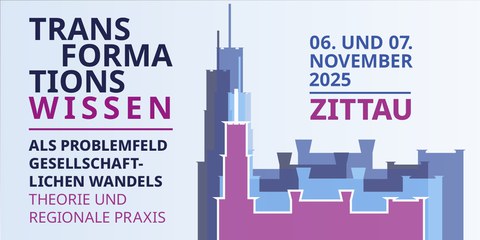Conference: Transformation knowledge as a challenge for societal change: theory and regional practice
Table of contents
Exposé
Transformation processes are an expression of comprehensive social change and require reflection in science, but also conscious support in practice at the level of regional structural change. Areas of tension are emerging between theory and practice, which require mutual awareness and processing. On the one hand, the question arises as to what extent the view from a scientific distance should be more closely tied to the real experiences on the ground and the local stakeholders in the transformation or whether it should remain at a distance that promises objectivity. Both perspectives bear witness to the ambivalent significance of knowledge in the relationship between science and society.
The initial question of the conference is therefore how transformation knowledge and the handling of this knowledge must be structured so that social transformations can succeed. Such transformation knowledge is thus deliberately not limited to certain disciplines or forms of knowledge, but includes scientifically generated knowledge as well as explicit and implicit knowledge of stakeholders and those affected by transformations (elites, citizens, civil society, etc.).
This general problem will be discussed with a special focus on the transformation process in Lusatia. Lusatia offers itself as a possible model region for the relationship between theory and practice in transformation research. Culturally, politically and socially, Lusatia seems to be permeated by tensions (right-wing populism, urban-rural, demographic change, post-extractivism) that can be read as exemplary for conflicts in Western modernity. On the other hand, Lusatia can also be seen as a pioneering region, in particular through its transformation into a science region with numerous funding and networking initiatives with some existing and some emerging institutions, the effects of which are not yet foreseeable, but which can already be reflected upon and then helped to shape.
The focus on the present and the region explicitly includes a historical or diachronic dimension. The starting point should be current or future challenges, which may also include a comparative link back to past transformation experiences or a comparative analysis of current transformation processes. Thus, in addition to the temporal orientation, there is a spatial orientation on an East-Central European, international and global level.
The following questions arise from the problems and the regional reference:
- What role has science played as a stakeholder in the transformation processes of recent years/decades? Which assumptions/findings were actually adopted by the actors and stakeholders? How were they communicated and what relevance did they ultimately have in the concrete everyday areas of activity of regional stakeholders? Which fields and assumptions of usefulness structure the social use of knowledge, for what is there a social demand/for what is there not - what differentiations can be seen, for example, between politics, planning, civil society, business, art, science? How does which scientific knowledge reach society and how and by what mechanisms does it work there? What partnerships, translation and transfer mechanisms do social fields/stakeholders develop in order to process transformation(s) with scientific knowledge? How does societal knowledge find its way back into science (keyword: accompanying research, transformative science, etc.)?
- How can demands for transparency and co-determination be met while maintaining the principles of representative democracy? What role does science play in this? Is there a need for a site-specific interpretation and design of concepts such as transdisciplinarity and co-production or transition management? What requirements for transformation knowledge do local transformation actors have? What is already available and how is it integrated? What external expertise is needed?
- What level of knowledge do we have today compared to previous relevant reflection processes? What has already been researched and how has this been done? What effects/interactions does the scientific examination of transformation processes have on the research design, for example?
- Which topics and disciplines are relevant to action and knowledge and who sets them? Where can science become more effective in terms of its practical relevance or where is more science or more research needed? What undesirable effects can scientific influence have?
- Which methods, instruments or theories can be used, and what gaps can be identified in this regard, both on the part of science and on the part of the relevant transformation actors?
Overall, the experiences and expertise of both science and, necessarily, the respective stakeholders (companies, politics, municipalities, etc.) will be examined. The conference therefore strives for an exchange that combines both perspectives.
Time and place
Time: November 06 and 07, 2025
Venues: Zittau Town Hall, Zittau / Görlitz University of Applied Sciences House Z IV
Program and registration
Further information on the program can be found on the program page and in the event documents (flyer, poster, etc.).
Please use the registration form to register for the event.
Questions or suggestions can be sent to Dr. Lucas von Ramin.
Partner institutions
You can find out more about the partner institutions on the Partner:innen page.


